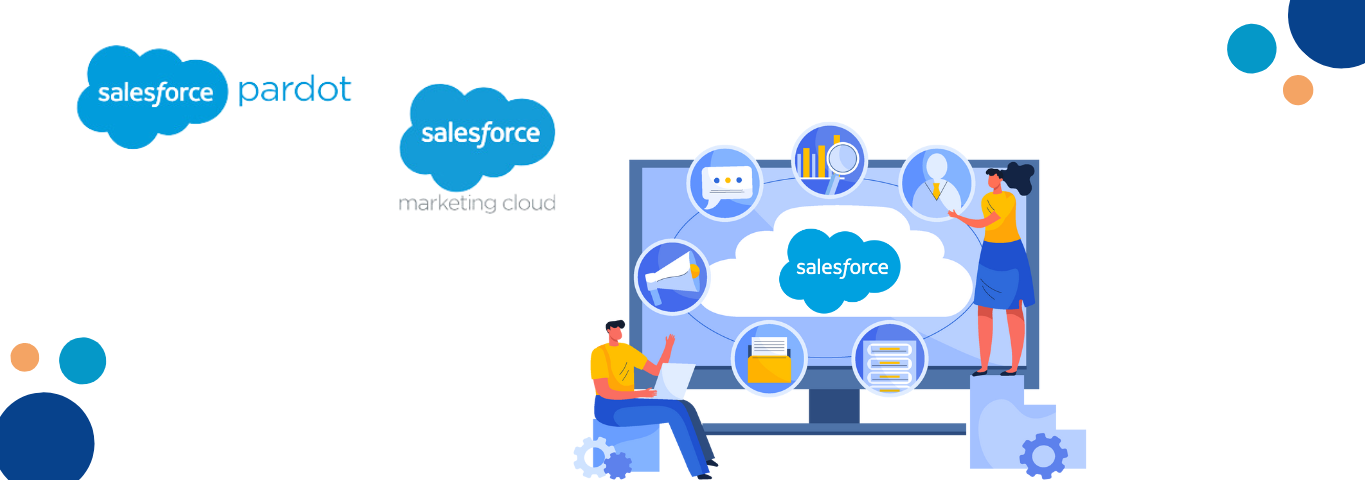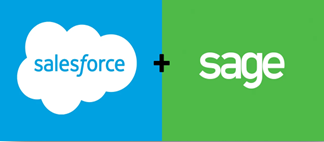Should I use Pardot or Salesforce Marketing Cloud? This is a question we frequently get from clients. This may sound odd, given that Pardot is typically considered a B2B solution and Salesforce Marketing Cloud is a B2C platform.
Using both can be pretty successful for any business, depending on your primary marketing channels!
Pardot excels in automated email marketing, prospect capture via forms and landing pages, and engagement tracking with Scoring Categories and Grading Prospects. Additionally, it has the best Salesforce integration available.
To strategically retarget an account or to re-engage with a set of prospects who may have become dormant, marketers occasionally require a channel in addition to email.
This is where the Advertising Studio module of Marketing Cloud comes into play. Here, you can rely on the Salesforce architecture to give your audience a smooth experience.
As shown in the image below, Pardot would be your data entry and automated email marketing platform, Sales Cloud would serve as your CRM and database of record, and Marketing Cloud Connect would be your method for triggering ads to target individuals in this database.
As you can see, the activity in Pardot begins when a record is generated or updated, from which point a prospect can be added to a Pardot Engagement Studio, causing an Automation Rule to be triggered or causing a Completion Action to be triggered.
The contact record update will sync to the CRM and then build or update a specific Salesforce Report for an Audience with the proper Sales Cloud connectivity.
When this activity occurs, the Marketing Cloud Connector enables the Marketing Cloud Automation Studio to initiate an automation that imports the contact record into a Data Extension. The source for an audience created in Advertising Studio is this Data Extension. From this point, marketing efforts are launched on digital platforms like Facebook, Google, and LinkedIn.
It is just one illustration of how seamlessly the marketing products from the Salesforce package combine.
Of course, from the perspective of the user, each of these platforms also has a very recognizable look and feel, enabling teams to design more complex journeys without being constrained by a single platform.
When are these platforms appropriate to use?
Businesses that can benefit most from using Pardot and Salesforce Marketing Cloud together are those who:
- Employ Sales Cloud as their CRM of choice.
- Run or desire to run ongoing digital advertising campaigns that target pre-identified prospects.
- On social media, they are highly active.
- Own the marketing resources to spend on all three Salesforce products.
Thanks to the Marketing Cloud pricing model, businesses do not pay a fixed price for access to all available studios, which builds a plan depending on the Studios (features) you want access to.
To demonstrate how Pardot and Marketing Cloud may operate together, we utilized Advertising Studio in this blog post. However, marketers can also use other studios to run sophisticated, end-to-end marketing campaigns.
Additional Studios in Marketing Cloud
Social Studio
This application, created to help marketers manage social media, has a fantastic listening feature that enables us to interact with prospects in Marketing Cloud, edit a field in Salesforce, and generate lists in Pardot. This can assist us in identifying the brand evangelists for our company.
Interaction Studio
This Marketing Cloud feature is incredibly potent and allows for real-time customization of digital experiences. While Marketing Cloud uses real-time interactions to customize the content, Pardot can direct traffic to your website.
Think about combining Pardot and Salesforce Marketing Cloud for a fully multi-channel automated marketing strategy.
Conclusion
The Power of Three—Pardot, Marketing Cloud, and Salesforce CRM—drives efficiency, effectiveness, and revenue growth for businesses. It unlocks the true potential of marketing automation, customer engagement, and data-driven decision-making. By harnessing the combined strength of these platforms, organizations can stay ahead of the competition, nurture valuable customer relationships, and drive business success in the digital age.






Comments